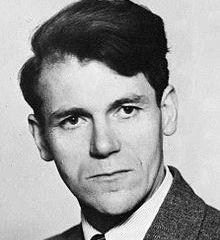Edmund Spenser Quotes - Page 3
Edmund Spenser, George Gilfillan (1859). “The poetical works of Edmund Spenser: With memoir and critical dissertations”, p.16
Edmund Spenser (1965). “Books I and II of the Faerie queene: the mutability cantos, and selections from the minor poetry”
What more felicity can fall to creature, than to enjoy delight with liberty?
'Muiopotmos' l. 209
Edmund Spenser, George Stillman Hillard (1842). “Faerie queene. book III-V”, p.245
Death is an equall doome To good and bad, the common In of rest.
Edmund Spenser (1805). “The Works of Edmund Spenser”, p.257
'The Faerie Queen' (1596) bk. 5, canto 12, st. 1
Edmund Spenser (1758). “The Fairy Queen”, p.272
How many perils doe enfold The righteous man to make him daily fall.
Edmund Spenser (1805). “The Works of Edmund Spenser ...”, p.37
Edmund Spenser, George Gilfillan (1859). “The Poetical Works of Edmund Spenser”
Edmund Spenser (1965). “Books I and II of the Faerie queene: the mutability cantos, and selections from the minor poetry”
Edmund Spenser, Roy Maynard (1999). “Fierce Wars and Faithful Loves: Edmund Spenser's The Faerie Queene”, p.125, Canon Press & Book Service
1590 Of the Garden of Adonis. The Faerie Queen, bk.3, canto 6, stanza 42.
Edmund Spenser (1849). “The Works of Edmund Spenser: With Observations of His Life and Writings”, p.240
Edmund Spenser, George Gilfillan (1859). “The poetical works of Edmund Spenser: With memoir and critical dissertations”, p.3
Edmund Spenser (1869). “The Faerie Queene: Disposed Into Twelve Bookes Fashioning XII Morall Vertues”, p.786
Edmund Spenser, George Gilfillan (1859). “The poetical works of Edmund Spenser: With memoir and critical dissertations”, p.45
Edmund Spenser, Carol V. Kaske (2006). “The Faerie Queene, Book One”, p.34, Hackett Publishing
It often falls, in course of common life, that right long time is overborne of wrong.
Edmund Spenser (1715). “The Works of Mr. Edmund Spenser”, p.86
The man whom nature's self had made to mock herself, and truth to imitate.
Edmund Spenser, George Gilfillan (1859). “The poetical works of Edmund Spenser: With memoir and critical dissertations”, p.36
For easy things, that may be got at will, Most sorts of men do set but little store.
Edmund Spenser, George Gilfillan (1859). “The poetical works of Edmund Spenser: With memoir and critical dissertations”, p.226







